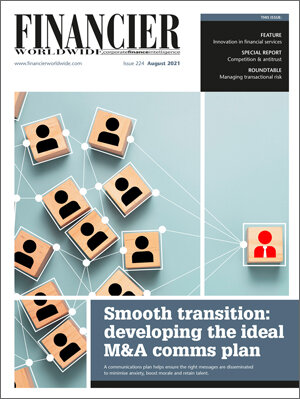Calibrating compliance and culture
August 2021 | SPOTLIGHT | FRAUD & CORRUPTION
Financier Worldwide Magazine
It is an all-too-familiar scene: a compliance officer from Multinational Company Inc.’s US corporate headquarters flies in to deliver pre-packaged, generic training to local employees, only to be met with blank stares. The room is silent, and the training ends with few questions.
Although the corporate team travelled to deliver the training in person, it still feels like there is an ocean between them and the local personnel. Despite the signed certifications and training attendance rolls, the compliance officer has no true confidence that the message has been received, much less taken to heart.
Process-oriented compliance teams from US, European and UK multinational corporate headquarters efficiently dispatch training and messaging, sometimes seemingly without much meaningful consideration for the recipients’ local culture, customs and social norms. This can result in lukewarm reception and only superficial adoption of compliance policies.
Companies should invest in tailoring compliance messaging and delivery to recipients’ culture, as well as in building a network of resident liaisons – global ‘compliance ambassadors’ – who can translate the company’s anti-corruption message to the local mindset and promote culturally sensitive messaging that bolsters commitment to ethical business.
Tailoring the message and delivery
Western governments and multinational corporations have for years – since the 1977 adoption of the US Foreign Corrupt Practices Act (FCPA), an anti-bribery law with transnational jurisdiction – been viewed by some as perpetuators of an imperialist or first-world dynamic when it comes to setting global standards for compliance. Complex, informal and relationship-based social customs in some cultures, such as guanxi in China, blat in Russia or wasta in parts of the Middle East, can seem to clash with the FCPA and other anti-bribery standards. With opposing forces at play, issues can go undetected if a company’s compliance team is oblivious to these local cultural norms.
Compliance officers and teams on the ground may need to spend time understanding and navigating complex societal foundations as they solicit buy-in from parties essential to compliance. Ignoring deeply ingrained social norms and hoping for the best is a sure recipe for disaster. At the heart of the matter is often a question of self-awareness: has Multinational Company Inc. invested sufficient resources in understanding local cultural nuances where it operates, and has it appropriately tailored its approach? Here, listening is often as important as conveying the compliance message.
Language barriers are one challenge, but cultural or mindset differences may be even more difficult to identify and navigate. In some Asian cultures, for example, a polite, nonconfrontational disposition can be misinterpreted as affirmation or agreement. In others, cordial formalities and exchanges are an essential and standard prerequisite for business or any interpersonal interaction.
From religious practices to the way people greet each other, unfamiliarity with local cultural norms can create distance between parties and be interpreted as Western arrogance, prompting unwanted plot twists, complicating company culture, and muddling the way messages are received and implemented. A culturally sensitive, tailored approach to compliance is a worthy investment: training, messaging and policies are worth only as much as the paper they are written on unless local teams buy in and commit to them.
Building a network of global compliance ambassadors
The tone from the top is important, but it is invaluable to have anti-corruption allies on the ground to bridge the cultural divides and to normalise and reinforce the company’s commitment to compliance in the context of the local culture. An effective compliance ambassador will help build social capital in a compliant manner and promote local buy-in. They should be self-starters that also empower local teams, listening to their ideas about how to make compliance work on the ground and facilitating a mutual dialogue with the rest of the company.
While the policy of zero tolerance for corruption must be unwaveringly non-negotiable, its delivery and framing make all the difference. The compliance message must go beyond a set of best practices to meaningfully iterate the benefits of ethical business in a culturally nuanced framework, and it can be beneficial if the person delivering that message is an insider – someone with knowledge and understanding of that framework. And as with many other approaches to anti-corruption compliance, the ‘global compliance ambassador’ model has potential to carry over to other environmental, social and governance (ESG) considerations, such as human rights, anti-slavery, diversity and inclusion, and wider governance factors.
External resources
Compliance departments, especially those with limited resources, may consider partnering with local anti-corruption non-governmental organisations (NGOs) as a resource to help shape the anti-corruption message to fit cultural nuances. Local embassies or chambers of commerce can be a good place to start to find reputable business networks dedicated to good governance and ethical business. When searching for compliance ambassadors, use caution not to end up working with local fixers, who may not have a sufficient understanding of your company’s absolute compliance commitment to anti-corruption laws.
Final thoughts
Even though the most prominent transnational law against foreign bribery is American, the anti-corruption message is inherently universal. It resonates with the shared reality of citizens all over the globe: no one wants to live in a world where the rule of law does not matter, where elites and their cronies can steal national resources with impunity. That message – the true core of anti-bribery efforts – is sometimes lost in uncalibrated messaging and delivery.
As communications pioneer Marshall McLuhan famously said, “the medium is the message”. In addition to tailoring compliance training and making an effort to understand local culture, decentralising the medium and carrying it through a network of local anti-corruption compliance ambassadors is a sound investment for companies committed to ethical business.
Illya Antonenko is director of compliance resources and data protection officer and counsel at TRACE. He can be contacted on +1 (410) 990 0076 or by email: iantonenko@traceinternational.org.
© Financier Worldwide
BY
Illya Antonenko
TRACE

